Overview
This article delves into the essential considerations for selecting between rock and mulch in luxury landscaping, emphasizing their unique features, advantages, and the benefits they offer to homeowners. Mulch, known for its ability to enhance soil health and retain moisture, plays a crucial role in promoting plant vitality. In contrast, rock provides durability and requires minimal maintenance, making it an excellent choice for aesthetic hardscaping. Ultimately, the ideal selection hinges on the specific needs of the landscape and the homeowner’s design preferences.
Have you considered how each option could transform your outdoor space? By understanding the distinct characteristics of rock and mulch, you can make an informed decision that not only elevates the beauty of your property but also enhances its value. Whether you prioritize lush greenery or a sleek, low-maintenance design, the choice between rock and mulch can significantly impact your landscape’s overall appeal.
Introduction
In the realm of luxury landscaping, the choice of materials significantly impacts both the aesthetic appeal and functionality of outdoor spaces. The ongoing debate between mulch and rock underscores the distinct benefits and challenges each option presents.
- Mulch, with its ability to enrich soil health and foster vibrant plant growth, serves a vital role in nurturing a thriving garden.
- In contrast, rocks provide durability and require minimal maintenance, catering to a different set of homeowner needs.
As homeowners strive to create stunning landscapes, one must ask: which material truly enhances the outdoor experience while striking a balance between beauty and practicality?
Understanding Mulch and Rock in Landscaping
Mulch is a vital element in landscaping, consisting of both organic and inorganic materials that are applied to the soil surface. Its primary functions encompass moisture retention, weed suppression, and the enhancement of soil health. Common types of ground cover include wood chips, bark, and straw, each contributing significantly to the overall vitality of the garden. Conversely, stone materials such as gravel, river stones, and granite are frequently utilized in hardscaping. These elements provide a durable, low-maintenance option that not only enhances the visual appeal of a landscape but also serves practical purposes, including effective drainage and erosion control.
In upscale landscaping, the choice between rock vs mulch can significantly impact appearance, maintenance requirements, and the health of vegetation. Have you considered how this selection might transform your outdoor space? Recent trends reveal a growing preference for integrating both materials, creating visually striking and functional outdoor environments. For instance, case studies indicate that high-end designs often blend the softness of organic materials with the rugged elegance of stone, resulting in landscapes that are both inviting and sophisticated.
The benefits of ground cover extend beyond aesthetics; it plays an essential role in fostering healthy plant development by improving soil structure and moisture retention. Landscape architects emphasize that the careful selection of ground cover can enhance the overall health of the garden, making it a crucial consideration in luxury landscaping projects. Meanwhile, the strategic use of stone offers modern advantages, such as the ability to delineate areas and pathways that guide the eye through the scenery.
As the landscape design industry evolves, the debate of rock vs mulch is increasingly recognized as a hallmark of luxurious outdoor spaces, showcasing a commitment to both aesthetics and practicality. How might this blend elevate your own outdoor living experience?
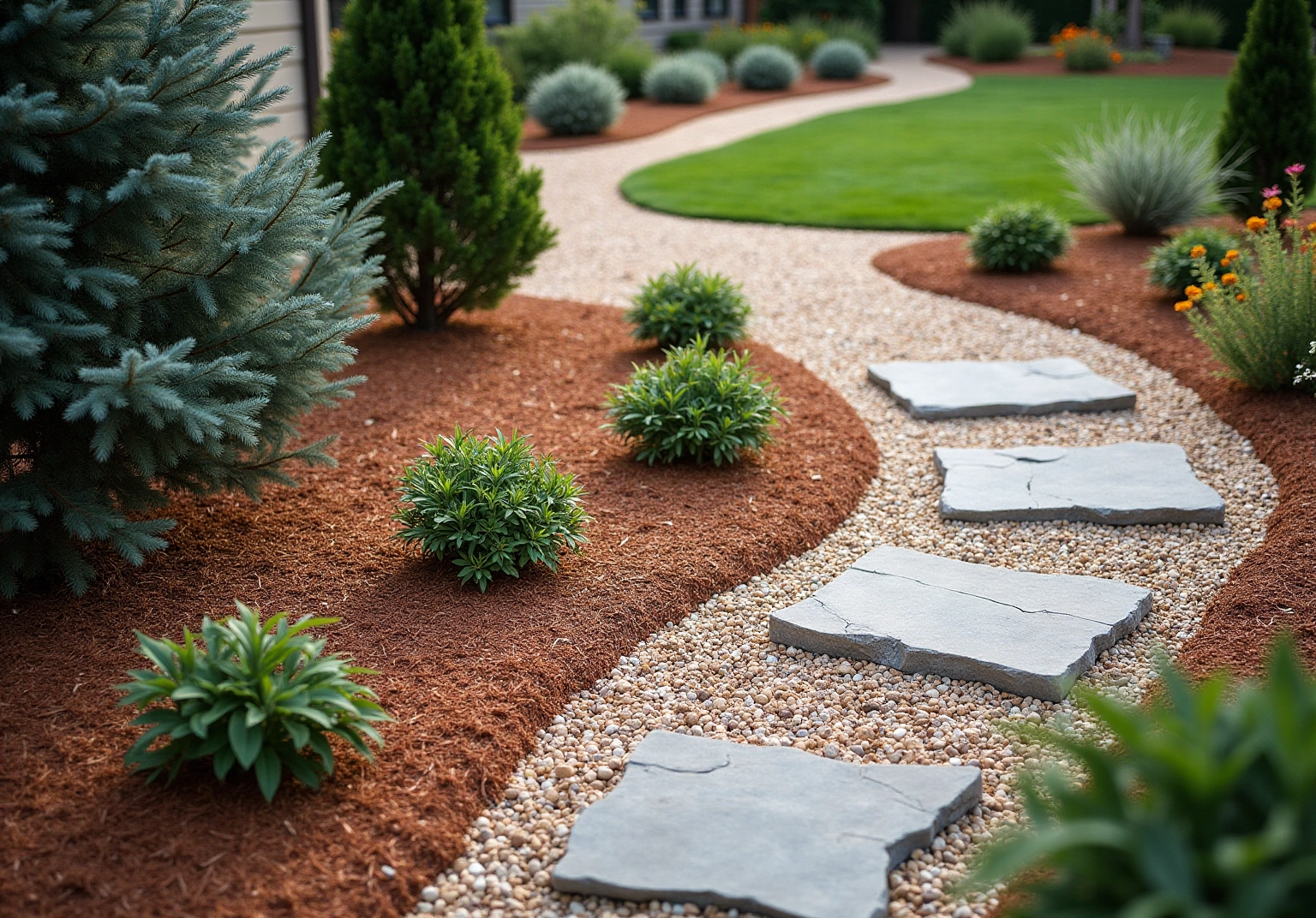
Advantages of Using Mulch
Mulch offers a range of benefits that are particularly advantageous for luxury landscaping, including moisture retention, temperature regulation, and weed suppression. By covering the soil, this material helps maintain consistent moisture levels, which can reduce watering needs by 25-50%. When properly utilized, ground cover can significantly lower water consumption in gardens, making it essential for high-end landscapes where sustaining lush, vibrant vegetation is crucial. Furthermore, organic matter helps regulate soil temperatures, keeping them 8-10°F cooler in summer and warmer in winter, thus protecting plant roots from extreme temperature fluctuations.
Natural coverings, such as wood chips and straw, not only retain moisture but also decompose gradually, enriching the soil with essential nutrients that promote healthy growth. Studies indicate that gardens mulched for three or more consecutive seasons can experience a 30-40% increase in water-holding capacity, enhancing drought resilience and overall plant vitality. This aligns with findings that consistent mulching across multiple seasons can significantly improve moisture retention.
Practical examples illustrate these benefits: elegant gardens employing organic materials have reported marked improvements in plant health and aesthetics, showcasing vibrant blooms and robust foliage. For instance, case studies like ‘Weed Prevention through Ground Cover’ and ‘Effects of Organic Ground Covers on Soil Moisture and Crop Growth’ highlight the practical applications of these materials in enhancing both the visual appeal and well-being of plants. Landscape design experts emphasize that the use of organic material not only elevates the aesthetic charm of outdoor spaces but also supports the enduring vitality of vegetation, making it a vital component of upscale outdoor design. Ultimately, the advantages of ground cover extend beyond mere aesthetics, fostering an environment where plants can flourish and homeowners can fully enjoy their outdoor retreats.
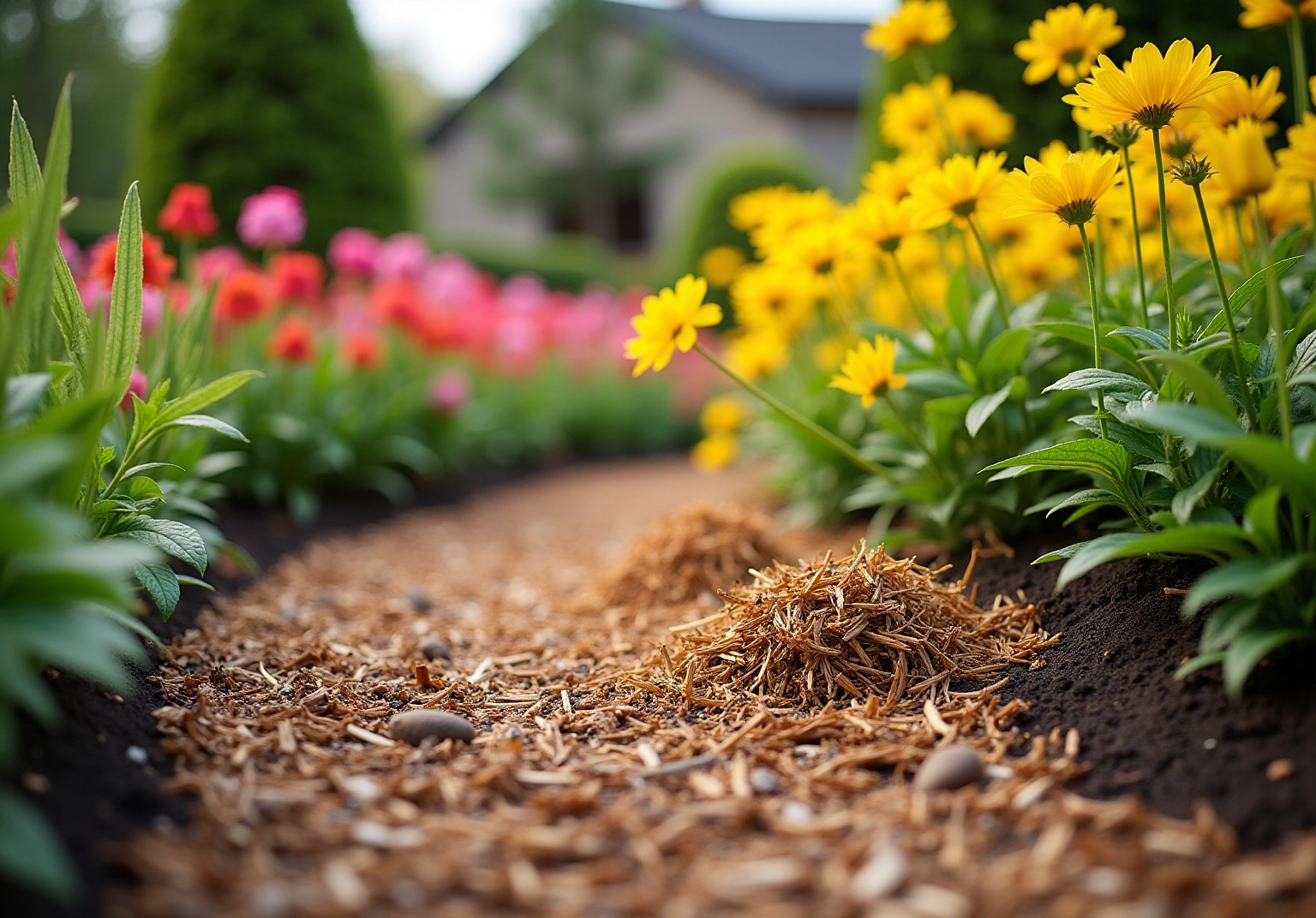
Disadvantages of Using Mulch
Ground cover offers several features that can enhance luxury landscaping, yet it also comes with notable disadvantages. Organic coverings, for instance, require frequent replenishment due to decomposition. This necessity can significantly increase maintenance expenses over time. In high-end landscapes, where aesthetics and the vitality of vegetation are crucial, the need for regular upkeep can be a considerable drawback. Additionally, if the covering material is applied too thickly, it risks suffocating root systems and creating an environment conducive to pests. Some organic coverings may even attract undesirable insects or fungi, posing extra risks to the health of your plants.
These challenges highlight the importance of careful consideration when selecting ground cover, especially when comparing rock vs mulch in upscale gardens. Maintaining a pristine appearance and ensuring the well-being of plants are paramount for luxury homeowners. As you explore outdoor design choices, consider how your consent and privacy are honored by service providers. This reflection guarantees a reliable relationship as you enhance your outdoor living area, ultimately elevating your lifestyle and property value.
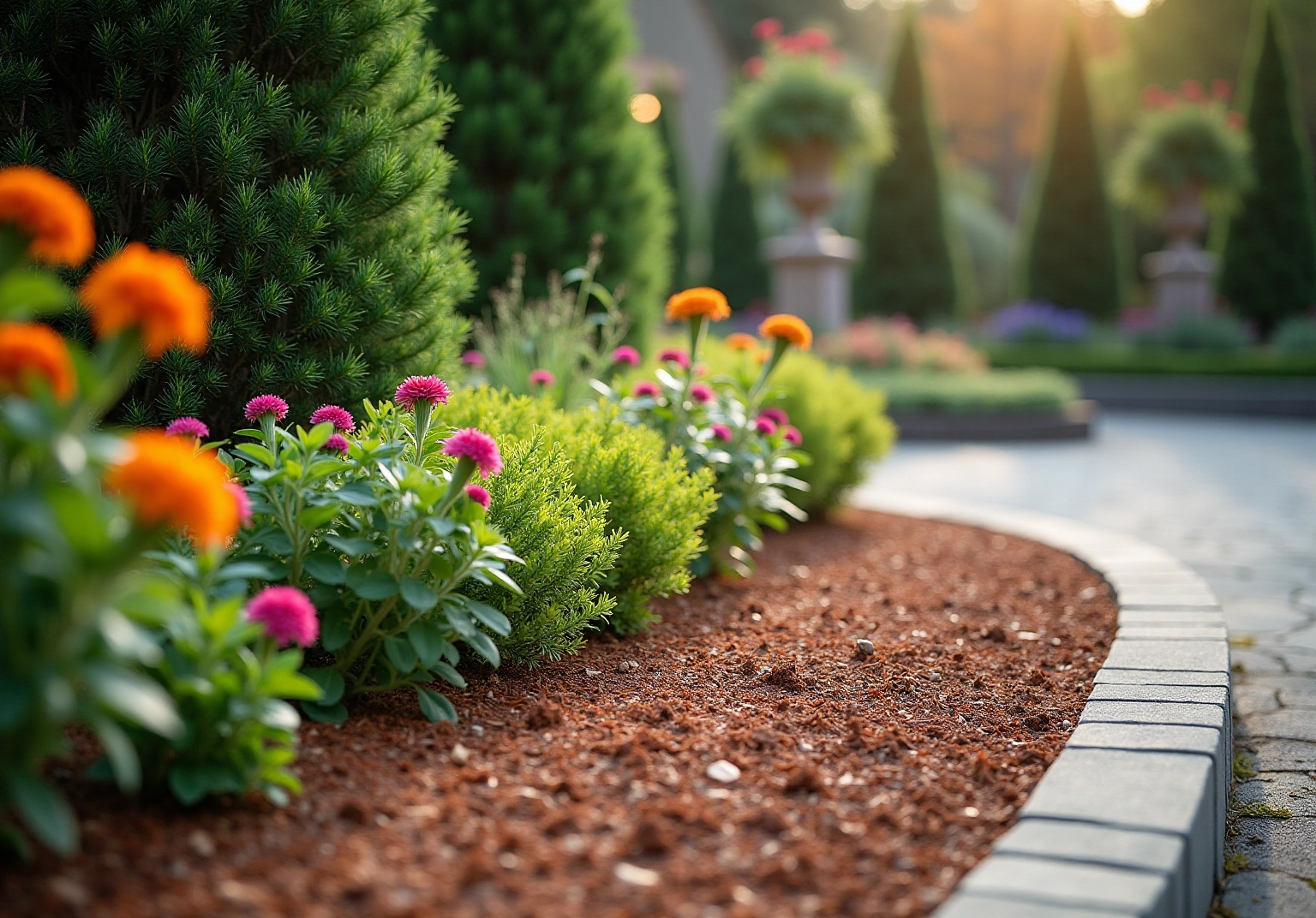
Advantages of Using Rock
Advantages of Using Rock
Rocks present numerous advantages in luxury landscaping, particularly due to their exceptional durability and low maintenance requirements. When considering rock vs mulch, it’s important to note that unlike organic mulch, which breaks down over time and requires frequent replacement, stones preserve their structure and appearance for decades, making them an economical long-term option. Their resilience against harsh weather conditions ensures that they remain visually appealing and functional, even in high-traffic areas.
In high-end gardens, stones play an essential role in drainage and erosion management, efficiently regulating water runoff and preventing soil degradation. This functionality is particularly beneficial in regions prone to heavy rainfall, where proper drainage is essential for maintaining the health of the landscape.
Key Benefits of Using Rocks:
- Durability: Rocks withstand harsh weather and high traffic, requiring minimal upkeep.
- Drainage Control: They effectively manage water runoff, preventing soil erosion.
- Aesthetic Appeal: Rocks provide a clean, modern look that complements high-end architecture, enhancing the overall design of outdoor spaces.
- Variety: Available in various shapes, sizes, and colors, including granite, limestone, and sandstone, they allow for creative design possibilities.
Grow Landscapes, with its expert landscape management team, ensures that your outdoor areas remain beautiful all year round. Their expertise in preserving immaculate landscapes complements the use of long-lasting materials such as stones, which can endure the elements while enhancing visual charm. Furthermore, Grow Landscapes focuses on personalized poolscape design, incorporating beautiful stone elements into pool areas for a harmonious and opulent outdoor experience.
Have you considered how stones can transform your outdoor spaces? Case studies have shown the efficacy of stones in high-end garden design projects. For example, homeowners in Dunedin, Florida, have indicated that landscaping cover stones not only lessen maintenance efforts but also endure severe summer storms without incurring damage. This durability makes them a reliable choice for creating resilient outdoor environments, particularly when considering rock vs mulch options.
Moreover, landscape architects highlight the significance of choosing resilient materials, especially in the context of rock vs mulch, to guarantee the durability of upscale outdoor areas. Their expert insights emphasize that incorporating stones into landscape designs not only improves visual attractiveness but also aids in the overall utility and sustainability of the garden. By selecting stones, homeowners can design breathtaking landscapes that require little maintenance while offering enduring appeal and functionality.
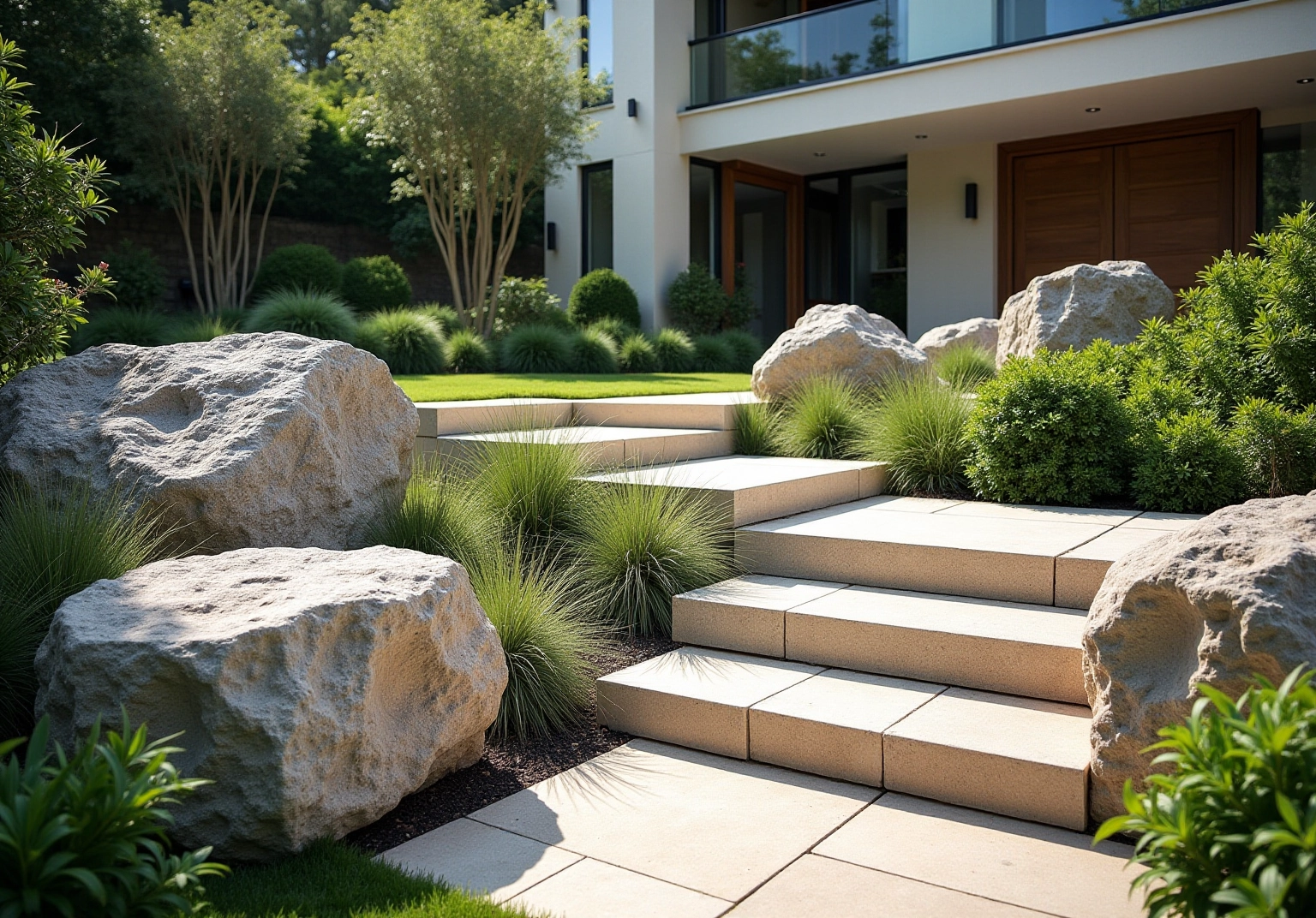
Disadvantages of Using Rock
While stones offer aesthetic appeal in landscaping, the comparison of rock vs mulch highlights notable drawbacks, particularly for upscale gardens. One significant feature is the higher upfront cost associated with stones compared to ground cover, which may deter some property owners from choosing them. Additionally, stones tend to absorb and retain heat, potentially straining vegetation during peak summer temperatures and impacting plant health. When considering rock vs mulch, it is important to note that unlike mulch, stones do not contribute nutrients to the soil, making them less suitable for gardens where soil enrichment is essential for thriving plants.
Moreover, the rigidity of stone arrangements can pose challenges; once installed, stones can be cumbersome to remove or adjust, limiting flexibility for design changes. This lack of adaptability can be especially concerning in upscale gardens, where aesthetic preferences may evolve over time. Case studies have shown that in high-end landscaping projects, the inability to modify stone features can lead to homeowner dissatisfaction, underscoring the importance of addressing both immediate and long-term landscaping needs.
Furthermore, it is crucial to consider the environmental impact of extracting and transporting stones, as this process can contribute to ecological degradation. Overall, while stones can enhance property values through their modern appeal, the potential disadvantages warrant careful consideration.
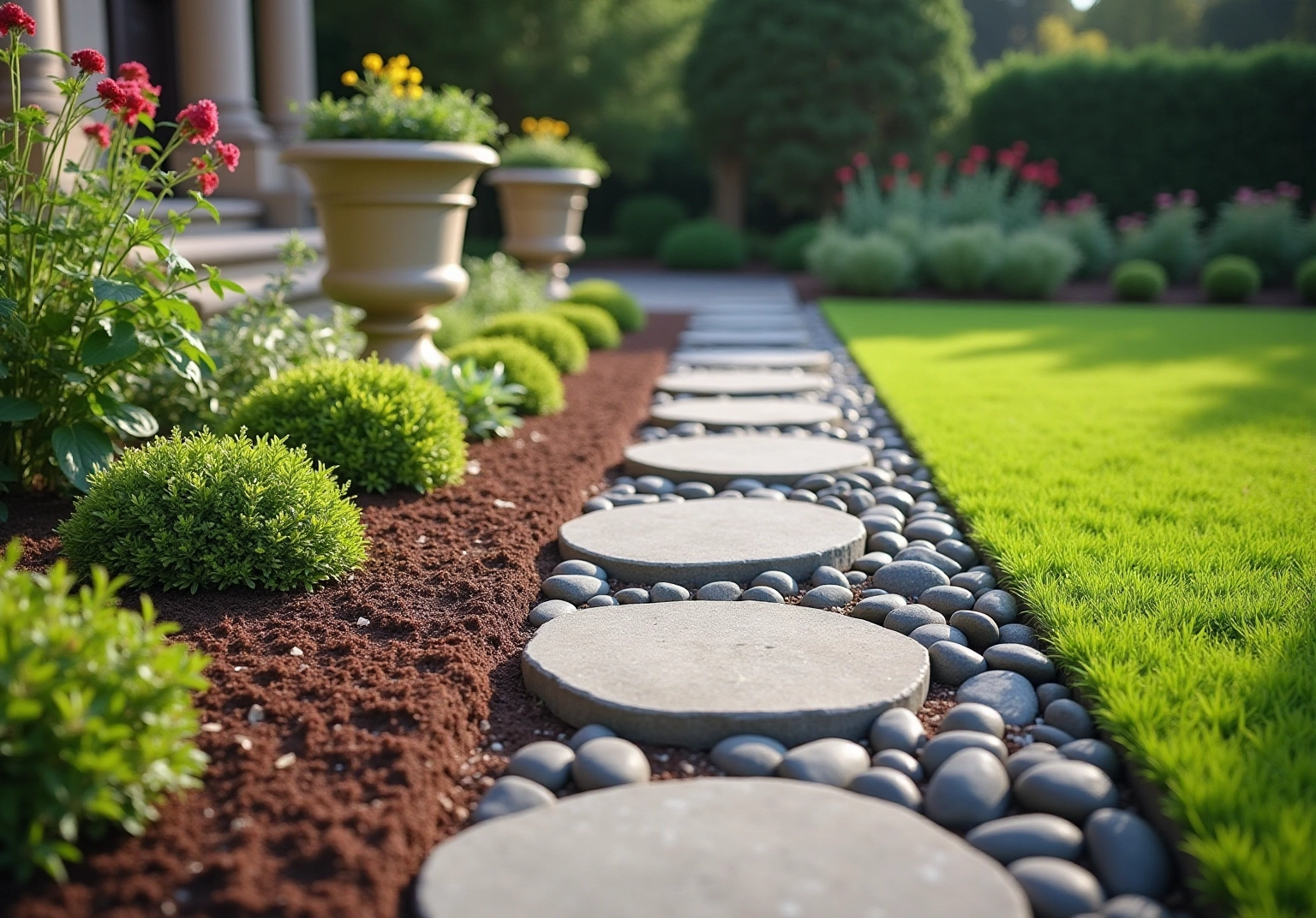
Comparative Analysis: Mulch vs. Rock for Luxury Landscaping
In the realm of luxury landscaping, the choice between rock vs mulch requires careful evaluation of several factors. Mulch is notable for its ability to enhance vegetation health by retaining moisture and enriching the soil with nutrients. This makes it especially advantageous for flower beds and gardens. Its organic composition not only supports vibrant plant growth but also enhances the overall aesthetic of the landscape. Furthermore, ground cover enhances rainwater infiltration and soil moisture retention, decreasing water evaporation. However, ground cover necessitates regular upkeep and replacement every one to four years, which can be a consideration for busy homeowners.
On the other hand, stone landscaping presents a low-maintenance and long-lasting option that significantly improves the aesthetic charm of hardscapes. It effectively manages drainage and withstands harsh weather conditions, making it suitable for areas prone to erosion or heavy rainfall. Although stones do not provide the same soil advantages as ground cover, their durability and resistance to decay make them an appealing choice for those seeking a ‘set it and forget it’ method. However, it is important to acknowledge that stones can retain heat, potentially damaging nearby vegetation during intense summers, and removing debris from stones can be time-consuming.
Ultimately, the choice between rock vs mulch depends on the specific requirements of the landscape. Factors such as the types of plants being cultivated, aesthetic preferences, and maintenance capabilities should guide homeowners in making an informed decision. Real-life examples illustrate that some homeowners effectively blend both substances, utilizing organic matter in garden beds for its nutrient advantages while opting for stones in high-traffic zones for their durability and minimal maintenance. This tailored approach allows for a harmonious blend of beauty and functionality in luxury outdoor spaces.
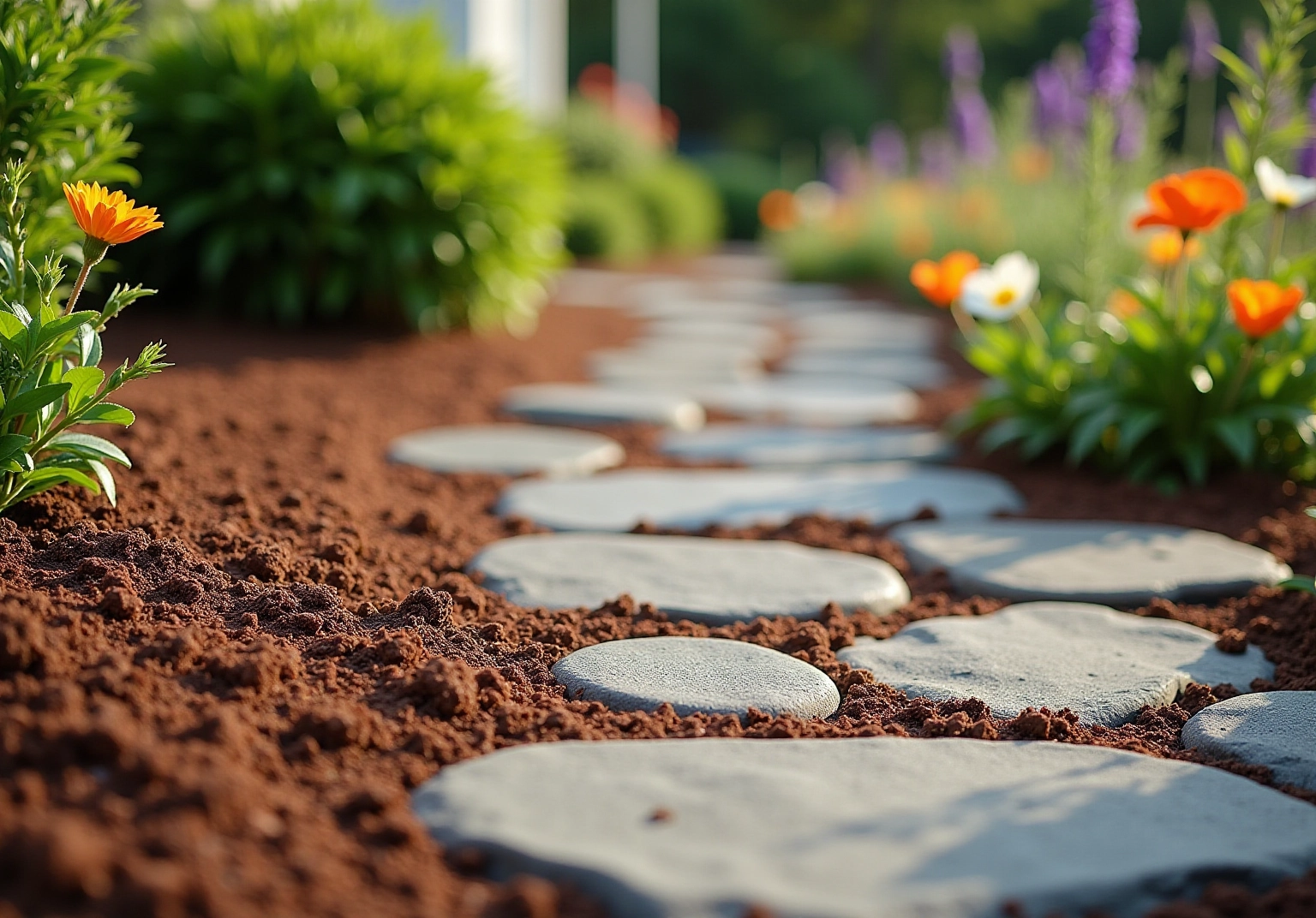
Choosing the Right Material for Your Landscape
Deciding between rock vs mulch for your landscape involves evaluating several key aspects. First, consider the specific requirements of your plants: if moisture retention and soil health are priorities, then ground cover may be the superior choice. For regions that demand low upkeep and resilience, stone could prove to be more appropriate. Additionally, think about the overall design aesthetic you wish to achieve.
Combining both materials can be effective; for instance:
- Using mulch in garden beds
- Employing rock vs mulch in pathways
- Placing rock around structural elements
This approach can enhance visual appeal. Consulting with a landscaping professional can provide tailored insights that cater to your unique outdoor space, ultimately enriching your living experience and property value.
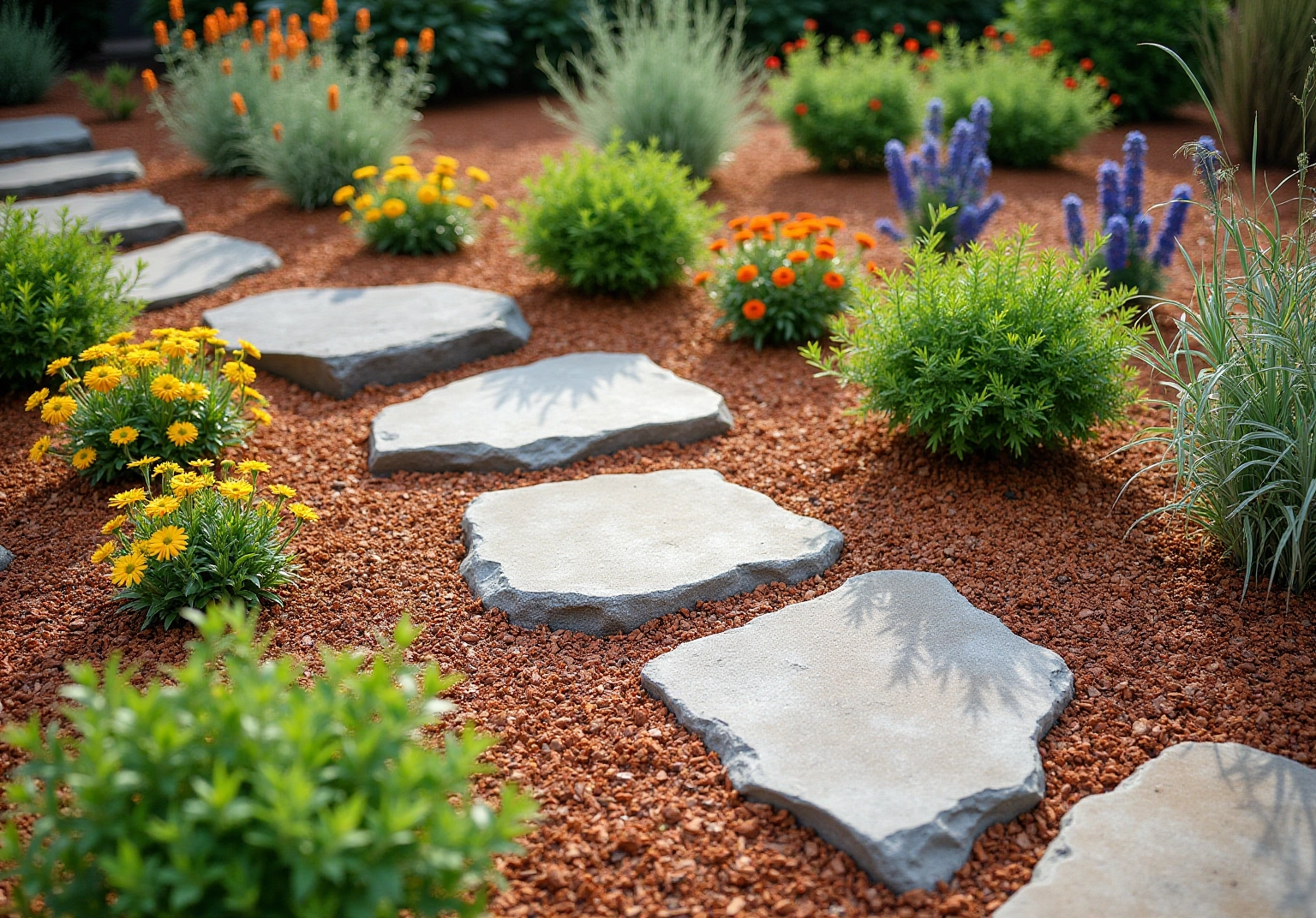
Conclusion
The decision between rock and mulch in luxury landscaping is pivotal, defining both the aesthetic and functional qualities of an outdoor space. Each material presents its unique features, advantages, and benefits, influencing not only visual appeal but also garden health and maintenance needs. By understanding these differences, homeowners can make informed choices that align with their landscaping goals.
Mulch excels in nurturing plant health through moisture retention and soil enrichment, making it ideal for vibrant gardens. Its advantage lies in promoting a flourishing ecosystem, while the benefit is a lush, thriving landscape. In contrast, rock offers durability and low maintenance, effectively managing drainage and providing a modern touch to hardscapes. The analysis reveals that while mulch requires regular upkeep, rocks provide a long-lasting solution that withstands the elements. By evaluating the specific needs of their landscape, homeowners can balance beauty and functionality.
Ultimately, the choice between rock and mulch should reflect personal preferences, plant requirements, and lifestyle considerations. Embracing a blended approach can yield stunning results, combining the organic benefits of mulch with the enduring charm of stone. As luxury landscaping evolves, prioritizing the right materials enhances outdoor aesthetics and elevates the overall living experience, transforming spaces into luxurious retreats that harmonize with nature.
Frequently Asked Questions
What is mulch and what are its primary functions in landscaping?
Mulch is a vital element in landscaping made from organic and inorganic materials applied to the soil surface. Its primary functions include moisture retention, weed suppression, and enhancing soil health.
What are some common types of mulch used in landscaping?
Common types of mulch include wood chips, bark, and straw.
How do stone materials differ from mulch in landscaping?
Stone materials, such as gravel, river stones, and granite, are used in hardscaping, providing a durable, low-maintenance option that enhances visual appeal and serves practical purposes like effective drainage and erosion control.
What are the benefits of using mulch in luxury landscaping?
Mulch offers benefits such as moisture retention, temperature regulation, and weed suppression, which can reduce watering needs by 25-50% and protect plant roots from extreme temperature fluctuations.
How does mulch improve soil health?
Organic mulch decomposes gradually, enriching the soil with essential nutrients that promote healthy plant growth and can significantly improve water-holding capacity.
What impact does consistent mulching have on gardens?
Gardens mulched for three or more consecutive seasons can experience a 30-40% increase in water-holding capacity, enhancing drought resilience and overall plant vitality.
How can the combination of mulch and stone materials enhance landscaping?
Integrating both materials creates visually striking and functional outdoor environments, blending the softness of organic materials with the rugged elegance of stone.
Why is the choice between rock and mulch significant in upscale landscaping?
The choice impacts appearance, maintenance requirements, and the health of vegetation, showcasing a commitment to both aesthetics and practicality in luxury outdoor spaces.
What role does ground cover play in fostering healthy plant development?
Ground cover improves soil structure and moisture retention, which are crucial for the overall health of the garden, especially in luxury landscaping projects.
How do landscape architects view the use of mulch and stone in design?
Landscape architects emphasize that the careful selection of ground cover, including both mulch and stone, can enhance the overall health and aesthetics of outdoor spaces, making it a key consideration in upscale landscaping.



